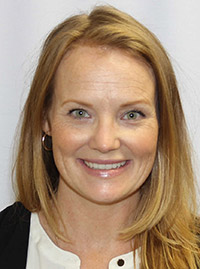
December Guzzo recently graduated with her Master of Social Work from The University of Alabama’s primarily online program. She is now using the degree to advance her work as a child forensic interviewer specialist/coordinator at the National Children’s Advocacy Center (NCAC), where she interviews children ages 3-19 who have experienced some type of abuse. She also interviews adults who have disabilities.
“Child forensic interviewing is a developmentally sensitive, legally sound way we can interview a child under a specific protocol. I’m not there to confirm or deny the allegations; I’m just there to collect the information from the child in a very specific way,” December explained.
The role of a child forensic examiner is critical for prosecuting perpetrators because most of the time, the interview is the only evidence the courts have. “If you think about evidence, for example, in a murder trial — collecting it is very specialized. You don’t want people traipsing through the crime scene; you call the specialists to collect it. Well, with sex abuse, the child’s memory is the evidence. Less than 5% of cases have any kind of physical evidence, so the interview is it. That’s why we do a lot of training here to teach people how to do that correctly.”
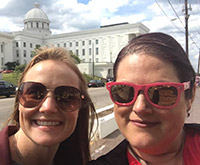 She continued, “Another big portion of my job is testifying in court. Defense attorneys come after me and investigators, but they don’t get to come after the children.” It was a friendly encounter with an attorney one day that helped December make the decision to go back to school and earn her MSW.
She continued, “Another big portion of my job is testifying in court. Defense attorneys come after me and investigators, but they don’t get to come after the children.” It was a friendly encounter with an attorney one day that helped December make the decision to go back to school and earn her MSW.
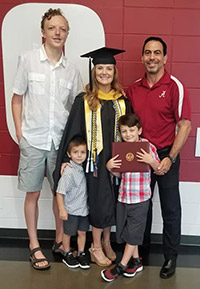
“I’m sitting there talking with this attorney after I testified, and he was asking me questions about my job. His daughter was interested in it, and he said, ‘What kind of schooling do you need? Do you have a PhD or something?’ And I just had to laugh at myself because I have all this experience, but I only had a BS. Then I saw April Hodges. She was this spitfire student intern from UA that was working with us, and she was doing her master’s online at UA, even with three kids who she homeschools. I was like, ‘I can do this?’ And she said, ‘Yes, you can do this!’ By the end of the week, I had already applied, gotten my recommendation letters and was ready to go. It was something I always wanted to do, but life got in the way. And I just decided I wasn’t going to let it.”
So in 2017, with three children (now 14, seven and five) and a demanding full-time job, December began the MSW primarily online program. After a decade out of school, she didn’t know what to expect. She was out of practice, and her first paper showed it. But her professor kindly sent it back and referred December to UA’s Writing Center, where they helped her work through it. After that, she excelled in her writing assignments.
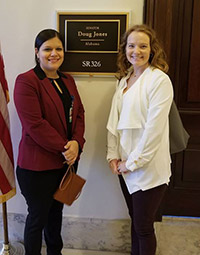 “Dr. Drolen wasn’t a jerk about it. She took the time and was gracious with me. That was my first experience of that kindness, and it continued throughout the program. My mother-in-law broke her hip at one point, and she had been my primary childcare. I emailed my professors, and they all worked with me more than I needed. I was careful not to take advantage of that, but they treated me like that because of the way I treated the program — they knew it was important to me. Another time, my child had the flu, and I was sitting there trying to get my work done, and I could hear him in the monitor crying for Mommy, so I emailed my professor and told her everything, and she understood. Then the very next day, I got it done.”
“Dr. Drolen wasn’t a jerk about it. She took the time and was gracious with me. That was my first experience of that kindness, and it continued throughout the program. My mother-in-law broke her hip at one point, and she had been my primary childcare. I emailed my professors, and they all worked with me more than I needed. I was careful not to take advantage of that, but they treated me like that because of the way I treated the program — they knew it was important to me. Another time, my child had the flu, and I was sitting there trying to get my work done, and I could hear him in the monitor crying for Mommy, so I emailed my professor and told her everything, and she understood. Then the very next day, I got it done.”
December said her adviser, Morion Siler, was amazing at walking her through everything, even with etiquette and style tips for coming to campus and what to wear. “Every time I reached out, I always got responses.”
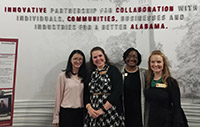 December’s coursework on juvenile mental health was particularly important to her because her oldest son has autism. “A lot on autism as well as other behaviors was familiar to me from my own child and the foster kids I knew from when I worked in foster care.” She and her MSW cohort “were able to have lots of conversations about how to practically apply the theoretical foundations we were learning. Knowing the theories and foundation of social work has really changed and shaped the way I work — the way I see things I’ve experienced and the way I train as well.”
December’s coursework on juvenile mental health was particularly important to her because her oldest son has autism. “A lot on autism as well as other behaviors was familiar to me from my own child and the foster kids I knew from when I worked in foster care.” She and her MSW cohort “were able to have lots of conversations about how to practically apply the theoretical foundations we were learning. Knowing the theories and foundation of social work has really changed and shaped the way I work — the way I see things I’ve experienced and the way I train as well.”
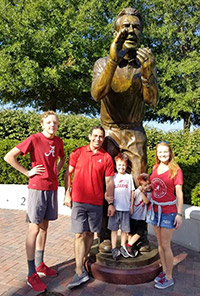 December also participated in the D.C. Fly-In through the program, where she was able to work with public policy and advocacy implementation in Washington. UA’s School of Social Work is the only institution outside of the Washington metro area that offers MSW students this unique opportunity. “Being able to see that process and knowing from my work experience how laws and the court process affect our families and our community made me decide to pursue the emphasis in Program Planning and Agency Administration with my degree because I want to make a larger change that has a greater impact than I can have in direct practice.”
December also participated in the D.C. Fly-In through the program, where she was able to work with public policy and advocacy implementation in Washington. UA’s School of Social Work is the only institution outside of the Washington metro area that offers MSW students this unique opportunity. “Being able to see that process and knowing from my work experience how laws and the court process affect our families and our community made me decide to pursue the emphasis in Program Planning and Agency Administration with my degree because I want to make a larger change that has a greater impact than I can have in direct practice.”
Through her internship with Dr. Williams and Chris Lim, December worked on a project to fight human trafficking and improve outcomes for juvenile victims. “They challenged me, and they were really great, and I learned so much through that internship.” It taught her how academia and research can play a role in effecting change in social work, and December has continued to partner with them professionally on the project. She’s also been promoted at work since the internship began.
December previously attended Auburn University and had been an Auburn fan her entire life. When asked if she would say “Roll Tide” now, she said, “Oh, I am an Alabama fan! How can you not be? After visiting campus and going to a few games and being a student and learning about all the good that The University of Alabama is doing, how can you not be an Alabama fan? I have an Alabama flag in my front yard and a sticker on my car, and I donated all my Auburn stuff to charity.” Maybe a tiger can change its stripes.
Published: August 30th, 2020

